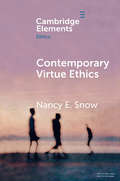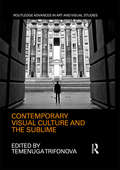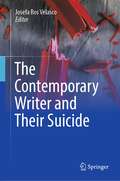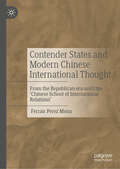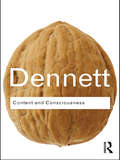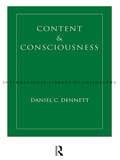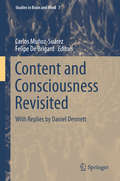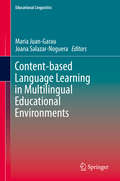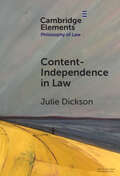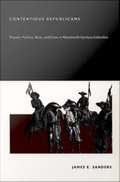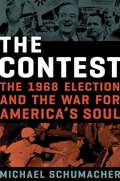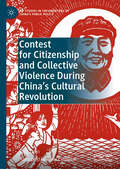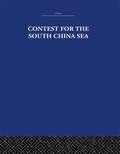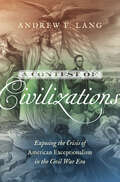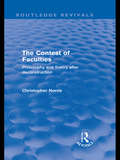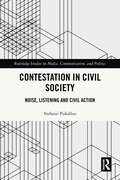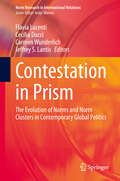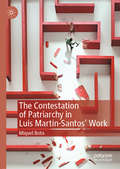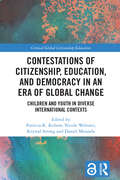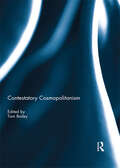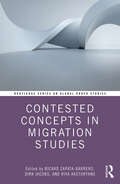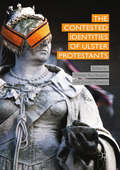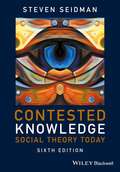- Table View
- List View
Contemporary Virtue Ethics (Elements in Ethics)
by Nancy E. SnowThis Element provides an overview of the central components of recent work in virtue ethics. The first section explores central themes in neo-Aristotelian virtue ethics, while the second turns the discussion to major alternative theoretical perspectives. The third section focuses on two challenges to virtue ethics. The first challenge is the self-centeredness or egoism objection, which is the notion that certain kinds of virtue ethics are inadequate because they advocate a focus on the person's own virtue and flourishing at the expense of, or at least without due regard for, the concerns of others. The second is situationist challenges to the ideas that there are indeed virtues and that personality is integrated enough to support virtues.
Contemporary Visual Culture and the Sublime (Routledge Advances in Art and Visual Studies)
by Temenuga TrifonovaIn the course of its long and tumultuous history the sublime has alternated between spatial and temporal definitions, from its conceptualization in terms of the grandeur and infinity of Nature (spatial), to its postmodern redefinition as an "event" (temporal), from its conceptualization in terms of our failure to "cognitively map" the decentered global network of capital or the rhizomatic structure of the postmetropolis (spatial), to its neurophenomenological redefinition in terms of the new temporality of presence produced by network/real time (temporal). This volume explores the place of the sublime in contemporary culture and the aesthetic, cultural, and political values coded in it. It offers a map of the contemporary sublime in terms of the limits—cinematic, cognitive, neurophysiological, technological, or environmental—of representation.
The Contemporary Writer and Their Suicide
by Josefa Ros VelascoThis volume is the continuation of the book Suicide in Modern Literature, edited by Josefa Ros Velasco. Considering the positive reception of this book, Ros Velasco launches the second part, entitled The Contemporary Writer and their Suicide. This time, leading representatives of various disciplines analyze the literary, philosophical, and biographical works of contemporary writers worldwide who attempted to commit suicide or achieved their goal, looking for covert and overt clues about their intentions in their writings. This book aims to continue shedding light on the social and structural causes that lead to suicide and on the suicidal mind, but also to show that people assiduous to writing usually reflect their intentions to commit suicide in their writings, to explain how these frequently veiled intentions can be revealed and interpreted, and to highlight the potential of artistic, philosophical, and autobiographical writing as a tool to detect suicidal ideation and prevent its consummation in vulnerable people. This book analyzes several case studies and their allusions to their contexts and the socio-structural and environmental violence and pressures they suffered, expressions of their will and agency, feelings of dislocation between the individual, reality, and existential alienation, and literary styles, writing techniques, and metaphorical language.
Contender States and Modern Chinese International Thought: From the Republican era until the ‘Chinese School of International Relations’
by Ferran Perez MenaThis book contends that the development of modern Chinese international thought has been profoundly shaped by the distinctive nature of the Chinese state as a contender state and its global positioning since 1912. The argument posited demonstrates that, notwithstanding the varied perspectives on the 'international' held by Chinese intellectuals throughout the 20th century, there exist commonalities across the periods analyzed in this book. In essence, the book emphasizes that the shared elements influencing the production of modern Chinese international thought do not derive from a unified cultural Chinese identity but rather stem from China's evolving geopolitical position in the modern world.
El contenido de la felicidad: Un Alegato Reflexivo Contra Supersticiones Y Resentimientos (Taurus Bolsillo Ser. #Vol. 32)
by Fernando SavaterUn alegato reflexivo contra supersticiones y resentimientos. «Que otros se ocupen de fijar el papel que la ética debe desempeñar en la vida; a mí lo que me preocupa es el puesto que la vida ha de tener en la ética. ¿Arte de vivir, camino de felicidad? ¿Responder a la voz del otro, responsabilizarse? ¿Instinto, sentimiento o cálculo? ¿Esfuerzo heroico o malicia irónica? Pasen y vean.»Fernando Savater
Content and Consciousness
by Daniel C. DennettContent and Consciousness is an original and ground-breaking attempt to elucidate a problem integral to the history of Western philosophical thought: the relationship of the mind and body. In this formative work, Dennett sought to develop a theory of the human mind and consciousness based on new and challenging advances in the field that came to be known as cognitive science. This important and illuminating work is widely-regarded as the book from which all of Dennett’s future ideas developed. It is his first explosive rebuttal of Cartesian dualism and one of the founding texts of philosophy of mind.
Content and Consciousness (International Library of Philosophy)
by Daniel C. DennettFirst published in 2002. Routledge is an imprint of Taylor & Francis, an informa company.
Content and Consciousness Revisited: With Replies by Daniel Dennett (Studies in Brain and Mind #7)
by Carlos Muñoz-Suárez Felipe De BrigardWhat are the grounds for the distinction between the mental and the physical? What is it the relation between ascribing mental states to an organism and understanding its behavior? Are animals and complex systems vehicles of inner evolutionary environments? Is there a difference between personal and sub-personal level processes in the brain? Answers to these and other questions were developed in Daniel Dennett's first book, Content and Consciousness (1969), where he sketched a unified theoretical framework for views that are now considered foundational in cognitive science and philosophy of mind. Content and Consciousness Revisited is devoted to reconsider the ideas and ideals introduced in Dennett's seminal book, by covering its fundamental concepts, hypotheses and approaches and taking into account the findings and progress which have taken place during more than four decades. This book includes original and critical contributions about the relations between science and philosophy, the personal/sub-personal level distinction, intelligence, learning, intentionality, rationality, propositional attitudes, among other issues of scientific and philosophical interest. Each chapter embraces an updated approach to several disciplines, like cognitive science, cognitive psychology, philosophy of mind and cognitive psychiatry.
Content-based Language Learning in Multilingual Educational Environments (Educational Linguistics #23)
by Maria Juan-Garau Joana Salazar-NogueraThe spread of English as an international language along with the desire to maintain local languages lead us to consider multilingualism as the norm rather than the exception. Consequently, bi/multilingual education has bloomed over the last decades. This volume deals with one such type of education currently in the spotlight as an essentially European strategy to multilingualism, CLIL (Content and Language Integrated Learning), in which curricular content is taught through a foreign language. The book contributes new empirical evidence on its effects on linguistic and attitudinal outcomes focusing on bi/multilingual learners who acquire English as an additional language. Moreover, it presents critical analyses of factors influencing multilingual education, the effects of CLIL on both language and content learning, and the contrast between CLIL and other models of instruction. The research presented suggests that CLIL can greatly enhance language acquisition in multilingual settings.
Content-Independence in Law: Possibility and Potential (Elements in Philosophy of Law)
by Julie DicksonThis Element examines the notion of content-independence and its relevance for understanding various aspects of the character of law. Its task should be understood expansively, as encompassing both inquiry into that which makes law into what it is, and inquiry into what law ought to be, which values it ought to serve, and which aspects of its character may play a facilitative role in law realising aspects of its potential. Many existing discussions of content-independence focus largely on the justificatory aspects of content-independence: whether, and, if so, how, there can be content-independent reasons for action, or content-independent justifications of rules, or the extent to which political obligation is content-independent. This Element, too, examines such issues but also seeks to explore an additional possibility: that the notion of content-independence can illuminate issues regarding law's existence, identification, and systematicity.
Contentious Republicans: Popular Politics, Race, and Class in Nineteenth-Century Colombia
by James E. SandersContentious Republicans explores the mid-nineteenth-century rise of mass electoral democracy in the southwestern region of Colombia, a country many assume has never had a meaningful democracy of any sort. James E. Sanders describes a surprisingly rich republicanism characterized by legal rights and popular participation, and he explains how this vibrant political culture was created largely by competing subaltern groups seeking to claim their rights as citizens and their place in the political sphere. Moving beyond the many studies of nineteenth-century nation building that focus on one segment of society, Contentious Republicans examines the political activism of three distinct social and racial groups: Afro-Colombians, Indians, and white peasant migrants. Beginning in the late 1840s, subaltern groups entered the political arena to forge alliances, both temporary and enduring, with the elite Liberal and Conservative Parties. In the process, each group formed its own political discourses and reframed republicanism to suit its distinct needs. These popular liberals and popular conservatives bargained for the parties' support and deployed a broad repertoire of political actions, including voting, demonstrations, petitions, strikes, boycotts, and armed struggle. By the 1880s, though, many wealthy Colombians of both parties blamed popular political engagement for social disorder and economic failure, and they successfully restricted lower-class participation in politics. Sanders suggests that these reactionary developments contributed to the violence and unrest afflicting modern Colombia. Yet in illuminating the country's legacy of participatory politics in the nineteenth century, he shows that the current situation is neither inevitable nor eternal.
The Contest: The 1968 Election and the War for America's Soul
by Michael SchumacherA dramatic, deeply informed account of one of the most consequential elections and periods in American history 1968—rife with riots, assassinations, anti–Vietnam War protests, and realpolitik—was one of the most tumultuous years in the twentieth century, culminating in one of the most consequential presidential elections in American history. The Contest tells the story of that contentious election and that remarkable year. Bringing a fresh perspective to events that still resonate half a century later, this book is especially timely, giving us the long view of a turning point in American culture and politics.Author Michael Schumacher sets the stage with a deep look at the people with important roles in the unfolding drama: Lyndon B. Johnson, Robert F. Kennedy, Eugene McCarthy, George Wallace, Richard Nixon, and especially Hubert H. Humphrey, whose papers and journals afford surprising new insights. Following these politicians in the lead-up to the primaries, through the chaotic conventions, and down the home stretch to the general election, The Contest combines biographical and historical details to create a narrative as intimate in human detail as it is momentous in scope and significance.An election year when the competing forces of law and order and social justice were on the ballot, the Vietnam War divided the country, and the liberal regime begun with Franklin D. Roosevelt was on the defensive, 1968 marked a profound shift in the nation&’s culture and sense of itself. Thorough in its research and spellbinding in the telling, Schumacher&’s book brings sharp focus to that year and its lessons for our current critical moment in American politics.
Contest for Citizenship and Collective Violence During China’s Cultural Revolution (IPP Studies in the Frontiers of China’s Public Policy)
by Yang LijunThis book has been groundbreaking for scholars of the Cultural Revolution, but hitherto was only available in Japanese and Chinese. This edition allows English-language readers to access the work for the first time. The author explains how political struggles within the state, competing sectarian interests, and other complex factors intertwined to produce various forms of collective violence that had a major impact on the political, economic, and social order of the time.
Contest for the South China Sea
by Marwyn SamuelsFirst published in 1982. Wide-ranging and fully documented, this book is the first detailed study of the origins, contexts and consequences of the long-standing dispute between China, Taiwan, Vietnam and the Philippines over the Paracel and Spratly Archipelagos in the South China Sea - one of the world's most strategically important inter-ocean basins and China's southern maritime frontier. Samuels' analysis: * Highlights the impact of the shifting balance of power in Asia and the growing competition for oceanic resources * Examines the implications of the dispute in terms of the historical and modern role of china as a maritime power in Asia.
A Contest of Civilizations: Exposing the Crisis of American Exceptionalism in the Civil War Era (Littlefield History of the Civil War Era)
by Andrew F. LangMost mid-nineteenth-century Americans regarded the United States as an exceptional democratic republic that stood apart from a world seemingly riddled with revolutionary turmoil and aristocratic consolidation. Viewing themselves as distinct from and even superior to other societies, Americans considered their nation an unprecedented experiment in political moderation and constitutional democracy. But as abolitionism in England, economic unrest in Europe, and upheaval in the Caribbean and Latin America began to influence domestic affairs, the foundational ideas of national identity also faced new questions. And with the outbreak of civil war, as two rival governments each claimed the mantle of civilized democracy, the United States' claim to unique standing in the community of nations dissolved into crisis. Could the Union chart a distinct course in human affairs when slaveholders, abolitionists, free people of color, and enslaved African Americans all possessed irreconcilable definitions of nationhood? In this sweeping history of political ideas, Andrew F. Lang reappraises the Civil War era as a crisis of American exceptionalism. Through this lens, Lang shows how the intellectual, political, and social ramifications of the war and its meaning rippled through the decades that followed, not only for the nation's own people but also in the ways the nation sought to redefine its place on the world stage.
Contest of Faculties: Philosophy and Theory after Deconstruction (Routledge Revivals)
by Christopher NorrisThis Routledge Revival, first published in 1985, gives detailed attention to the bearing of literary theory on questions of truth, meaning and reference. On the one hand, deconstruction brings a vigilant awareness of the figural and narrative tropes that make up the discourse of philosophic reason. On the other it insists that argumentative rigour cannot be divorced from the kind of close reading that has come to characterize literary theory in its more advanced or speculative forms. This present-day ‘contest of faculties’ has large implications for philosophers and critics, many of whom will welcome the reissue of such a clear-headed statement of the impact of deconstruction.
Contest Theory: Incentive Mechanisms and Ranking Methods
by Milan VojnoviContests are prevalent in many areas, including sports, rent seeking, patent races, innovation inducement, labor markets, scientific projects, crowdsourcing and other online services, and allocation of computer system resources.<P><P> This book provides unified, comprehensive coverage of contest theory as developed in economics, computer science, and statistics, with a focus on online services applications, allowing professionals, researchers and students to learn about the underlying theoretical principles and to test them in practice. The book sets contest design in a game-theoretic framework that can be used to model a wide-range of problems and efficiency measures such as total and individual output and social welfare, and offers insight into how the structure of prizes relates to desired contest design objectives. Methods for rating the skills and ranking of players are presented, as are proportional allocation and similar allocation mechanisms, simultaneous contests, sharing utility of productive activities, sequential contests, and tournaments.
Contestation in Civil Society: Noise, Listening and Civil Action (Routledge Studies in Media, Communication, and Politics)
by Stefanie PukallusContestation in Civil Society looks at the dynamic relationship between noise, listening and civil action as the key to understanding how societies communicatively make decisions about their internal and external boundaries.By focusing on the three components of noise, listening and civil action, the book moves attention away from an exclusive focus on what is being communicated – the communicator, the statement, the speech and so on. It argues that what is being communicated – the noise – does not lead in and of itself to civil action but rather that the audience – the listeners – plays a crucial role in determining what the noise means, whether it is judged legitimate or not and whether any civil action should be taken.Exploring how the relationship between noise, listening and civil action plays out within the context of contestation will interest academics and scholars of political studies, political philosophy, communication, sociology, media and cultural studies.
Contestation in Prism: The Evolution of Norms and Norm Clusters in Contemporary Global Politics (Norm Research in International Relations)
by Jeffrey S. Lantis Carmen Wunderlich Flavia Lucenti Cecilia DucciThis book analyses the complex dynamics of international norm contestation and explores how norms adapt and withstand challenges in different settings. Examining the interplay between various types of contestation, norm robustness, and the resilience of norm clusters, it sheds light on what the authors define as ‘contestation in prism’. The book thus presents norm contestation as a multifaceted process with far-reaching implications. In this context, it further discusses different conceptions of contestation, ranging from reactive vs. proactive contestation and applicatory vs. validity contestation, to inadvertent, i.e. interpretive vs. deliberate contestation. It then develops a theoretical model that links contestation ‘in prism’ with studies of norm clusters, or norms that are embedded in broader normative structures and interwoven with other normative meanings. Based on a strong theoretical framing, the book presents in-depth analyses of norm contestation in areas such as regional organizations, nuclear non-proliferation, norms relating to atrocities, and international criminal law. Offering multifaceted perspectives on norm evolutions and their implications, this contribution will appeal to students, scholars, and researchers of international relations and related disciplines, as well as policy-makers interested in a better understanding of contestation and norm cluster resiliency.
The Contestation of Patriarchy in Luis Martín-Santos' Work
by Miquel BotaThis book proposes that Spanish author Luis Martín-Santos’ work focuses on the effects of patriarchy and hegemonic masculinity on men, to actively contribute to freeing both men and women from the yoke of patriarchy. It aims for a new resonance of Luis Martín-Santos. It analyzes the influence of Heidegger, Freud and Sartre in Martín-Santos’ psychiatric essays and his fictional works: the novel Tiempo de silencio (Time of Silence), the collection of short stories Apólogos, and the posthumous fragment Tiempo de destrucción (Time of Destruction). It demonstrates that alongside the political critique of Franco’s dictatorship, Martín-Santos’ creative writings are an attempt to destroy the prevalent masculine myths of Western patriarchy, and a proposal to create new myths for the future.
Contestations of Citizenship, Education, and Democracy in an Era of Global Change: Children and Youth in Diverse International Contexts (Critical Global Citizenship Education)
by Patricia K. Kubow Nicole Webster Krystal Strong Daniel MirandaContestations of Citizenship, Education, and Democracy in an Era of Global Change: Children and Youth in Diverse International Contexts considers the shifting social, political, economic, and educational structures shaping contemporary experiences, understandings, and practices of citizenship among children and youth in diverse international contexts. As such, this edited volume examines the meaning of citizenship in an era defined by monumental global change. Chapters from across both the Global South and Global North consider emerging formations of citizenship and citizen identities among children and youth in formal and non-formal education contexts, as well as the social and civic imaginaries and practices to which children and youth engage, both in and outside of schools. Rich empirical contributions from an international team of contributors call attention to the social, political, economic, and educational structures shaping the ways young people view citizenship and highlight the social and political agency of children and youth amidst increasing issues of polarization, climate change, conflict, migration, extremism, and authoritarianism. The volume ultimately identifies emergent forms of citizenship developing in formal and non-formal educational contexts, including those that unsettle the nation-state and democracy. Edited by a team of academics with backgrounds in education, citizenship, and youth studies, this book will appeal to scholars, researchers, and faculty who work across the broader field of youth civic engagement and democracy, well as international and comparative education and citizenship.
Contestatory Cosmopolitanism
by Tom BaileyContemporary global politics poses urgent challenges – from humanitarian, migratory and environmental problems to economic, religious and military conflicts – that strain not only existing political systems and resources, but also the frameworks and concepts of political thinking. The standard cosmopolitan response is to invoke a sense of global community, governed by such principles as human rights or humanitarianism, free or fair trade, global equality, multiculturalism, or extra-national democracy. Yet, the contours, grounds and implications of such a global community remain notoriously controversial, and it risks abstracting precisely from the particular and conflictual character of the challenges which global politics poses. The contributions to this collection undertake to develop a more fruitful cosmopolitan response to global political challenges, one that roots cosmopolitanism in the particularity and conflict of global politics itself. They argue that this ‘contestatory’ cosmopolitanism must be dialectical, agonistic and democratic: that is, its concepts and principles must be developed immanently and critically out of prevailing normative resources; they must reflect and acknowledge their antagonistic roots; and they must be the result of participatory and self-determining publics. In elaborating this alternative, the contributions also return to neglected cosmopolitan theorists like Hegel, Adorno, Arendt, Camus, Derrida, and Mouffe, and reconsider mainstream figures such as Kant and Habermas. This collection was originally published as a special edition of Critical Horizons.
Contested Concepts in Migration Studies (Routledge Series on Global Order Studies)
by Ricard Zapata-Barrero Riva Kastoryano Dirk JacobsThis volume demonstrates that migration- and diversity-related concepts are always contested, and provides a reflexive critical awareness and better comprehension of the complex questions driving migration studies. The main purpose of this volume is to enhance conceptual thinking on migration studies. Examining interaction between concepts in the public domain, the academic disciplines, and the policy field, this book helps to avoid simplification or even trivialization of complex issues. Recent political events question established ways of looking at issues of migration and diversity and require a clarification or reinvention of political concepts to match the changing world. Applying five basic dimensions, each expert chapter contribution reflects on the role concepts play and demonstrates that concepts are ideology dependent, policy/politics dependent, context dependent, discipline dependent, and language dependent, and are influenced by how research is done, how policies are formulated, and how political debates extend and distort them. This book will be essential reading for students, scholars, and practitioners in migration studies/politics, migrant integration, citizenship studies, racism studies, and more broadly of key interest to sociology, political science, and political theory.
The Contested Identities of Ulster Protestants
by Thomas Paul Burgess Gareth MulvennaThis study explores the idea voiced by journalist Henry McDonald that the Protestant, Unionist and Loyalist tribes of Ulster are '. . . the least fashionable community in Western Europe'. A cast of contributors including prominent politicians, academics, journalists and artists explore the reasons informing public perceptions attached to this community.
Contested Knowledge: Social Theory Today
by Steven SeidmanIn the sixth edition of Contested Knowledge, social theorist Steven Seidman presents the latest topics in social theory and addresses the current shift of 'universalist theorists' to networks of clustered debates. Responds to current issues, debates, and new social movements Reviews sociological theory from a contemporary perspective Reveals how the universal theorist and the era of rival schools has been replaced by networks of clustered debates that are relatively 'autonomous' and interdisciplinary Features updates and in-depth discussions of the newest clustered debates in social theory—intimacy, postcolonial nationalism, and the concept of 'the other' Challenges social scientists to renew their commitment to the important moral and political role social knowledge plays in public life
